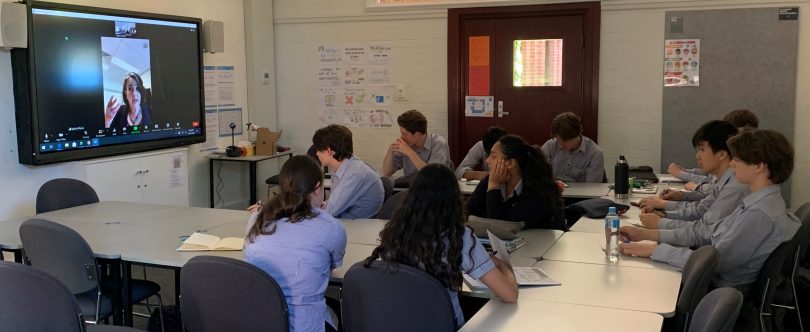
Students who learn Chinese also gain an understanding of Chinese culture. Photo: Canberra Grammar School.
Learning a language other than English has long been a part of our school curriculums, and when pushed, most adults will be able to remember a few words they learned from their school years.
But despite the best efforts of our language teachers, few of us study languages in the later years of high school and beyond. And, unless you come from a family where a language other than English is spoken at home, even fewer people will be fluent in a second language.
So if we aren’t achieving a bilingual society, what is the point of studying languages at school?
Language educators say there are many benefits beyond achieving fluency. These include improvements in cognitive flexibility, decision making, and important insights towards intercultural understanding.
While most older Australians primarily learned European languages at school, with some Latin thrown in for the classicists, as Australia has grown to take its place in the Asia/Pacific region, the trend to learn Asian languages, Mandarin, in particular, has been growing.
Four government primary schools, five high schools and most secondary colleges offer Chinese language programs in the ACT, along with six non-government schools. Opportunities to learn Chinese in Canberra are clearly flourishing.
Canberra Grammar School coordinator of Asian engagement Justin Hassall says offering Chinese is not just about teaching language, but showing students how to fully embrace and engage with Asia and the wider world.
”The students of today are our first truly global generation. They will live, study and work all over the world, across cultures and languages, and especially in Asia, so we need to give them the skills and the confidence to engage,” Mr Hassall said.
“Language education delivered across the curriculum enables students to get a grasp of the language but also gain insights into a country and a culture very different to ours.”
Along with learning the sounds, words and characters of Chinese, Justin says students at Canberra Grammar School also gain knowledge of cultural differences, history and geopolitics.
“In the primary years, it is all about the fun stuff, like food, art and costumes, later in the high school years, they can learn about the Cultural Revolution, geography and the Open Door policy.
“We can teach goodwill towards China. This way, in their future lives, if they are doing business in Asia, they will at least have a sense of the differences.”
While Chinese is often perceived as a difficult language, Mr Hassall says students usually enjoy it.
“As a teacher, I make mistakes too, but the students do love to catch me out.
“Language can help break down barriers. Knowing even a few words shows you have made an effort; you don’t have to be fluent,” Mr Hassall said.

Canberra Grammar School Students have regular online lessons with two schools in China. Photo: Canberra Grammar School.
Australia China Business Council President ACT Branch Jenny Chen agrees.
“Students who learn Chinese gain insight into behaviours and customs and develop an understanding of Chinese culture,” Ms Chen explained.
She says this helps demystify the differences and helps when negotiating, and facilitates respect.
“When you are dealing with a different country, it is important to understand everything else, not just the words,” Ms Chen said.
Ms Chen said the availability of Mandarin in schools is good for Chinese students too.
“The Chinese community in Canberra is not as big as in Sydney or Melbourne, many teenagers, not wanting to stand out from their peers, may not speak their mother tongue any more, but then regret a lost ability and a lost identity it when they are an adult,” Ms Chen said.
“Learning langue at school helps them find their identity and be confident in themselves, not just in business but in the wider community in Canberra.”
Mr Hassall says despite the setbacks of the global pandemic and current political rhetoric, there is little doubt that the future will continue to be shaped by Asia’s economic, political and educational emergence as the world’s dominant region.
“By teaching Chinese language, we will not only improve and increase the understanding of the people within our own region, but we will also be and providing opportunities for our young people to prosper.”













